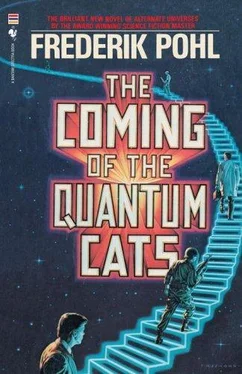Frederik Pohl - The Coming of the Quantum Cats
Здесь есть возможность читать онлайн «Frederik Pohl - The Coming of the Quantum Cats» весь текст электронной книги совершенно бесплатно (целиком полную версию без сокращений). В некоторых случаях можно слушать аудио, скачать через торрент в формате fb2 и присутствует краткое содержание. Год выпуска: 1986, ISBN: 1986, Издательство: Bantam Books, Жанр: Фантастика и фэнтези, на английском языке. Описание произведения, (предисловие) а так же отзывы посетителей доступны на портале библиотеки ЛибКат.
- Название:The Coming of the Quantum Cats
- Автор:
- Издательство:Bantam Books
- Жанр:
- Год:1986
- ISBN:9780553763393
- Рейтинг книги:5 / 5. Голосов: 1
-
Избранное:Добавить в избранное
- Отзывы:
-
Ваша оценка:
- 100
- 1
- 2
- 3
- 4
- 5
The Coming of the Quantum Cats: краткое содержание, описание и аннотация
Предлагаем к чтению аннотацию, описание, краткое содержание или предисловие (зависит от того, что написал сам автор книги «The Coming of the Quantum Cats»). Если вы не нашли необходимую информацию о книге — напишите в комментариях, мы постараемся отыскать её.
The Coming of the Quantum Cats — читать онлайн бесплатно полную книгу (весь текст) целиком
Ниже представлен текст книги, разбитый по страницам. Система сохранения места последней прочитанной страницы, позволяет с удобством читать онлайн бесплатно книгу «The Coming of the Quantum Cats», без необходимости каждый раз заново искать на чём Вы остановились. Поставьте закладку, и сможете в любой момент перейти на страницу, на которой закончили чтение.
Интервал:
Закладка:
"The good news," she said gloomily, "is that we have proof now that the Cathouse Project works. The bad news is they got it before us, and they're using it; and the even worse news is that there seems to be more than one other time-line involved. There's no other explanation that saves the facts."
"That's the way it looks to me," I agreed, "but who are these other ones?" Shakes of the head. "Christ. I'm not used to this kind of stuff."
Flash of a grin from Edna. "Who is?"
"Well, but it's your project!" I protested. "If you don't know what's going on, who does?"
"I said I wasn't used to it, Senator. I didn't say I didn't understand it—part of it, anyway." She saw my eyes on her cigarettes and plucked one out for me. "For instance," she said, lighting us both up, "we know quite a lot about the time-line of our visitors—the invading ones, that is; the one where you're a major in the army."
"We do?"
"To be sure. They're invading because they want to get at an enemy in their time through the back door—the same as we were preparing to do."
"Dr. Valeska," I said, "we weren't preparing. The mission of the Cathouse was to study feasibility. There were no operational plans."
She shrugged, dismissing the distinction as without enough difference to matter. "There's one other solid deduction, and one other fact. The deduction is that, although they've got pretty far along with time-crossing, there is at least one other time-line that's got farther. The one that produced the first Dominic DeSota."
I noticed that not only had the others in the room begun to cluster around to listen, but even the guard in the doorway was flapping his ears in our direction. Well, why not? Maybe I could read something from his expression. "How do you know that?" I asked, watching the guard out of the corner of my eye.
"Because these other people-we'll call them Population One—can slip one person through at a time and pull him back from the other side. I don't think Population Two—the invaders—can do that." The frown on the face of the guard made that seem plausible, I thought. Edna Valeska was noticing it, too, I could tell. "So," she said, "there's another player in this game."
"So we might have an ally," I said hopefully. "The Population One people might be as vulnerable as we are, only to Population Two."
The guard was goggling at us now, and the look of worry on his face was comforting. We were talking about things that he didn't want to think about. I turned to smile at him. Mistake. He glowered at me and backed away, his weapon stiffly at port arms, no expression at all on his face any more. But that was a kind of confirmation too.
"On the other hand," said Edna Valeska, "if the Population One people were going to do anything for us they had every chance to warn us. They didn't do that."
That was true enough, and I began to feel as discomfited as the guard. "So what's the other fact we know about the Population Two people-the invaders?" I ask.
"The Soviet Union is their principal enemy."
I said, "Yes, so it seems. But that's hard to believe! After the nuke war, when the Chinese did the decapitation bit in 1960, bombing Moscow and Leningrad—"
"Right, Dom," Colonel Martineau put in, "but, you see, in their time that didn't happen. We've pieced that all together, from the things we found out when we were questioned. The Soviets had only one big outside war. Around 1940, I think. They got into a war with Finland, and the Germans got involved—"
"The Germans!"
Martineau nodded. "The Germans didn't have their revolution. A man named Hitler took power, and the war was pretty bad. The Russians won, and after the war they occupied most of Eastern Europe, under their leader, Josef Stalin."
That was toughest of all to swallow. "Now, wait a minute! I know who Stalin was! He ran the country for a while until his assassination. His grandson's a friend of mine, as a matter of fact. He's the Russian ambassador to the U.S. We play bridge. He's a good friend of—some friends of mine," I finished, not wanting to mention Nyla Bowquist. I caught a glimpse of the guard, more cautious this time, but once again definitely listening. "Old Joe," I lectured, "was killed by some kind of Georgian separatist underground. And the English had had their general strike that turned into a revolution. They went socialist, the way they still are, and the Russian Litvinov got to be boss of the U.S.S.R. because he had good English connections. Had an English wife, as a matter of fact. And then, after 1960, the Germans had their counterrevolution and the kaiserin came back, and now they and Japan are the big competitors . . . " I trailed off. I wasn't scaring the guard any more. I was just boring him. Not to mention what I was doing to Edna and Colonel Martineau.
The colonel shook his head. "None of that happened in their time," he said. "For the last thirty-odd years they've only had two real superpowers, the Russians and the Americans. And they want to knock out the competition."
The guard wasn't only bored. He wasn't even listening any more. There was a faint stir from the front of the O's Club, and he was watching whatever was happening there. By then all of us in the room had been casting sidelong glances at our living litmus paper to see when what we said produced a reaction, and when it stopped reacting the conversation died.
"Oh, hell," said one of the junior scientists, and shrugged to say that it was a general comment with no specific follow-up planned.
Edna Valeska fretted, "Hell and damn. My husband's going to be worried sick. He never wanted me to take night duty. I wish I could let him know I was all right."
"I wish the same thing," I said.
The colonel nodded. "In my line of work my wife's had to get used to this kind of thing—well, not this kind of thing, I mean, but not being able to call her all the time. I know it's different for civilians. I bet you're worried about your wife, Dom."
"What? Oh, sure," I agreed, and didn't add, Her too.
They fed us again before noon. It was canned spaghetti and meatballs out of the dregs of the Officers' Club kitchen supplies, but there was plenty of milk and decent coffee. "Fattening us up for the kill," said one of the junior scientists gloomily, and, on cue, our new guard came into the room with his machine-pistol at the ready, followed by Nyla. Sergeant Nyla Sambok, that was, with two more armed privates at her side.
She looked us over politely. "If you'll finish your coffee," she said, "we're about ready to take you to more comfortable quarters."
"Where's that?" asked Colonel Martineau.
"Not far, sir. If you'll come along now, please." The voice was Nyla's own. So was the "please"—a nice touch, I thought, under the circumstances. The way her troopers unshipped their weapons to cover us wasn't. Whether we had finished our coffee or not, we moved.
We didn't have far to go. Outside the air-conditioned club the desert heat hit us all between the eyes, but we weren't in it long. Out the door. Across the wide and empty base street. Into the front door of the Cathouse, and clattering down a flight of steps to a big, cluttered basement room. Once it had been a pistol range. Now it was full of people with the green invader armbands, some OD-painted things like generators, but with heavy cables snaking outside to where we could hear diesels thudding away . . . and a tall, rectangular screen of featureless jet black.
That was the first time I ever saw a portal. I didn't have to be told what it was. It was simply a blackness hanging in the air, almost big enough to fill the room from side to side; and it was scary. Colonel Martineau snapped: "Sergeant! I demand to know what your intentions are!"
"Yes, sir," she agreed. "An officer will brief you. This is for your own comfort and safety, sir."
Читать дальшеИнтервал:
Закладка:
Похожие книги на «The Coming of the Quantum Cats»
Представляем Вашему вниманию похожие книги на «The Coming of the Quantum Cats» списком для выбора. Мы отобрали схожую по названию и смыслу литературу в надежде предоставить читателям больше вариантов отыскать новые, интересные, ещё непрочитанные произведения.
Обсуждение, отзывы о книге «The Coming of the Quantum Cats» и просто собственные мнения читателей. Оставьте ваши комментарии, напишите, что Вы думаете о произведении, его смысле или главных героях. Укажите что конкретно понравилось, а что нет, и почему Вы так считаете.












